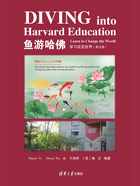
Preface Ⅰ
In the Harvard of myth, students are diligently studying and professors are busy professing when they are not quiet in their labs and libraries, united in reverential respect for learning passed down over the centuries. The real Harvard is a great deal noisier and more complicated, as is every great American university, because the mission of the university is so much more complex than simply pouring the knowledge of one generation into the minds of the next. As the Greek philosopher Plutarch wrote almost two thousand years ago: “A mind is not a vessel to be filled but a flame to be kindled.”(1) Kindling a mind is an exercise in animating, not merely shaping, a living human being. People can’t be taught the way robots might be.
And universities are always stretched between the conflicting goals of preserving the past and creating the future. At the beginning, in 1636, Harvard’s main job was to protect the New World colony against the illiteracy that would result should the ministers die before another ship carrying more could arrive from England. But even then, the New Englanders recognized that the College would be more than an archive of inherited facts and skills. The reason for founding Harvard, they wrote in 1643, was “to advance learning and perpetuate it to posterity”(2)—both research and teaching, we might say today. Visitors to Harvard will find those very words inscribed on the gate that marks the main entrance to the university.
In this remarkable volume, Haiqin Yu and Justin M. Thomas (Zheng Tao) have documented the thoughts of some of Harvard’s greatest thinkers and most skilled practitioners, about the craft of teaching and the role of the university. Rather than fitting their own frame of reference over the thoughts of others, the editors have allowed the best of the best to speak for themselves. You will find here reflections of the medical anthropologist Arthur Kleinman, who has devoted a lifetime to the deep moral understanding of Chinese society. You will find the empathetic thoughts of a young dean who helps Harvard students achieve their full potential, of a mature scientist who inspires Harvard students to devote their lives to preserving a habitable earth, and of many other men and women whose contributions, like so many brilliant mosaic tiles, together create a beautiful whole unlike any of its individually beautiful pieces. You will find here reflections on every aspect of Harvard life, an account of the sprawling organism which all of us in the Harvard community, blind as we are while feeling only a leg or tusk of the elephant, think we understand but know only incompletely. And you will also find the thoughtful reflections on both the theory and practice of holistic engineering education, by a genuine educational pioneer, founding president of Olin College Richard Miller.
So it will be up to you, dear reader, to discern the whole. And by the time you have an image in your mind, the reality may well have changed. Harvard is nothing if not dynamic. Creativity, not harmony, is the cherished value here, even when we are most devoted to perpetuating our inheritance. To perpetuate knowledge and gain wisdom, we cannot accept them as they are given to us; every generation must revive, revise, and re-interpret what we receive.
And that is why the most venerable American universities are so often the seedbeds of social as well as intellectual progress. The great William James, founder of the science of psychology, put it succinctly in 1903. “The true Harvard,” he said at a dinner assembled in his honor, “is the invisible Harvard in the souls of her more truth-seeking and independent and often very solitary sons. Thoughts are the precious seeds of which our universities should be the botanical gardens... Here they find the climate so propitious that they can be happy in their very solitude. The day when Harvard shall stamp a single hard and fast type of character upon her children, will be that of her downfall. Our undisciplinables are our proudest product.”(3)
You will find here the invisible Harvard, in the words and thoughts of her truth-seeking and independent souls. You will, I think, find this portrait of the true Harvard as enlightening as I have always found the institution to be inspiring.
Harry Lewis
Gordon McKay Research Professor of Computer Science, Harvard University
Author of Excellence without a Soul and Ideas that Created the Future
April 2021
Copyright 2021 by Harry R. Lewis. Permission is hereby granted to use this document as preface to any edition and translation of the book, Diving into Harvard Education: Learn to Change the World.
(1) PLUTARCH. On listening[M] // PLUTARCH. Plutarch’s moralia. London: W. Heinemann, 1927.
(2) ELIOT J. New England’s first fruits[M] // SABIN J. Sabin Americana 1500-1926. London: Printed by R.O. and G.D. for Henry Overton, 1643.
(3) JAMES W. The true Harvard[Z]. Speech at the Harvard Commencement dinner, June 24, 1903. Boston, etc. Reprinted in Harvard Graduates’ Magazine for September, 1903.